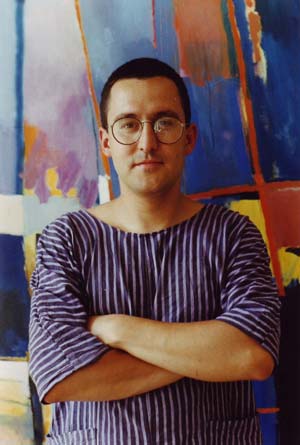

In the fractured world of modern music, finding an angle isn't easy. British pianist John Law tackles matters from three perspectives: he's just recorded the final part of a solo trilogy based on early monastic music; he's working with an improv quartet featuring Louis Moholo, Barry Guy and Paul Dunmall; and at the end of 1996 he released two striking albums with his regular jazz trio. One of these, The Onliest, containing cleanly articulated versions of Thelonious Monk tunes, shows just how good the group are at seeking out the living heart of a tune. It also harks back to Law's earliest encounter with jazz, shortly after he veered off a path which was leading him inexorably towards a career as a classical pianist.
“Ironically I stopped playing classical music in Vienna [where he was studying]. Shortly after that I heard jazz for the first time and thought: this is fantastic, this is what I really want to do! Being a classical musician I thought I'd have to buy some music, and I went to a sheet music shop and saw the face of Thelonious Monk staring up at me. I thought: wow, what a name! But I couldn't really play it. I couldn't work out what was going on in it.”
On the more open-ended Giant Leaves (Autumn Steps) the trio work with a free-floating intelligence reminiscent at times of the lucidity of Paul Bley's work, or the enigmatic, multi-faceted reconstructions of familiar tunes performed by Paul Motian's groups. “What I'm trying to do with this group is to find the essence of jazz tunes without playing a style. It's like the stucco on architecture. It's defined and it's too precise and it's been done very well by lots of people.
Law began playing at four years old and it was a serious business from the start. He was studying Schoenberg at nine and Stockhausen at ten. Large-scale composition followed in his teens and he was awarded a scholarship to the Royal Academy of Music in London. Yet it all fell away shortly after his studies had led him to Vienna and his belief in that direction collapsed. After such a reversal, his subsequent encounter with jazz came as a kind of rebirth. While hea has embraced some of the most challenging (and beautiful) music on the free scene (his work with Jon Lloyd, for instance, on 1993's excellent Head album) he's impatient with novelty-or-nothing attitudes towards music.
“I'm not that interested in the new for its own sake. You get that sometimes in improvised music - that you have to have a very splintered approach. I find this partly arbitrary but also very superficial. I don't know whether you can be shocking any more. When you have a piece by Nam June Paik which involves the performer crawling inside the vagina of a live whale, what could I do to shock?”
If the idea of enduring threads of development and the critical use of the past runs through Law's conversation, self-critcism is ever-present too. He describes himself as satisfied by only five per cent of what he comes up with while practising, and despite the feats of his childhood, he denies being a “natural” pianist. Like the piano players he admires (Paul Bley, Cecil Taylor, Keith Tippett) the main aim now is to approach a language of his own, to make a distinctive footprint in the mud. “In the end you only have one life and you want to leave something behind you. I want to leave a body of work that I can stand by.”
